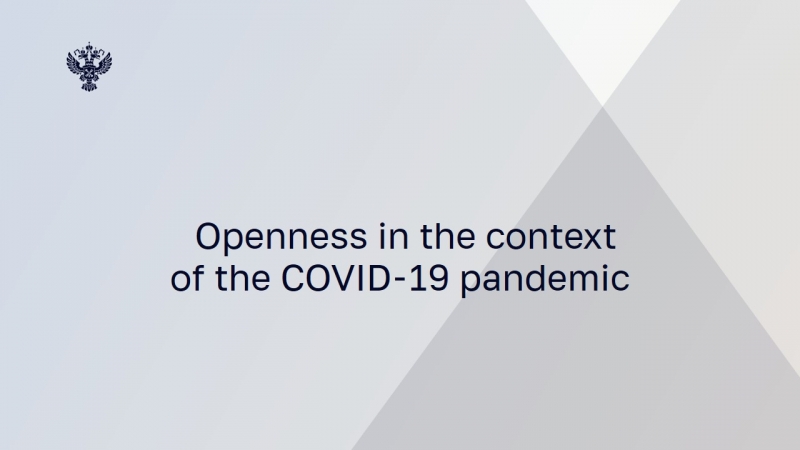1. Open Government Criteria
According to the OECD principles, an open government means that citizens, businesses and civil society organisations can
• know – obtain relevant and understandable information;
• acquire – obtain public services and interact with the government;
• create – participate in decision-making.
The same approach is applied in Russia. For example, the concept of open government in the report Open Government in Russia of 2019 prepared by the Accounts Chamber together with the Autonomous Non-Commercial Organization "Infocultura" and the Center for Advanced Governance is based on three key elements:
• openness of information;
• functional openness (open data);
• open dialogue.
This year, the Accounts Chamber and its partners continue to monitor the openness of public bodies and will soon present the results.
2. Openness of Information
During the COVID-19 pandemic, special focus has been placed on the transparency of budget expenditures to combat the impact of the epidemic. Supreme Audit Institutions provide their independent assessment of the government’s performance in this regard.
The French Court of Auditors has published the report of the High Council for Public Finances on its website on the epidemic-related amendments to the 2020 State Budget: the high level of uncertainty associated with the health crisis affects all macroeconomic forecasts and leads to their frequent revision.
The SAI of Germany has prepared an analytical report “Federal Budget Policy Measures to Combat the Impact of the Coronavirus Pandemic (Key Figures for the 2020 Supplementary Budget)” reflecting the changes associated with extra funds allocated to combat the epidemic and the adoption of a new crisis package.
The SAI of Brazil has started monitoring the efforts made by all federal administrations to combat the spread of COVID-19. The special plan for monitoring COVID-19 measures expands the scope of control of public institutions beyond the Ministry of Health.
3. Functional Openness
In light of the current situation, functional openness is illustrated by open data on public procurement conducted in a short time with simplified procedures. There are scheduled audits, separate monitoring on each issue and information panels, including the aggregator website Gosraskhody (State Expenditures), a service of the Accounts Chamber designed to collect current information on the state of the public procurement system in Russia..
The SAI of Cyprus has analysed public contracts of the Ministry of Health with private medical centers to test 20 thousand public and private sector employees for SARS CoV-2. The analysis revealed an overpricing of the tests, as well as risks of oligopoly or unfair competition.
The SAI of the Czech Republic started to audit public procurement of personal protective equipment during the state of emergency, for which CZK 11 billion ($430 million) was spent from the state budget.
The Accounts Chamber of the Russian Federation presented a report “Assessment of Openness of State Information Systems in Russia” in March. Experts found that only 16% of state information systems had high-quality and accessible data. The quality of data in state information systems became particularly important during a pandemic, said Aleksei Kudrin, Chairman of the Accounts Chamber, in an interview.
4. Open Dialogue
In the face of the COVID-19 epidemic, it is important to carefully coordinate policy-making, consider specific features of regions, cities and opinions of particular citizens. In this situation, open dialogue enables citizens to influence social and economic policies and political decision-making processes in their countries.
The government of Slovenia agrees on new steps to lift restrictions with union representatives every seven days, depending on the needs of each industry and each profession.
The SAI of Peru has developed an online platform for citizens to report wrongdoings and has launched an online office to receive and register public authorities’ documents during the state of emergency.
5. Social media, blogs and games as tools for openness
The way information is consumed is constantly changing. Specific features of different channels need to be considered in order to facilitate access to useful information that helps to develop taxpayer sentiments in more people and share government results with new audiences.
The SAI of Colombia regularly posts relevant information on countering COVID-19 on its Twitter account.
Gareth Davies, Head of the UK SAI, tells about the SAI’s response to the COVID-19 pandemic on his blog.
The SAI of Mexico has developed a children’s game app about public administration, audit, the public, gender equality, inclusion.
Read the full version of the digest here.
Noticias
How the coronavirus changes the openness of governments: analytical portals and new platforms for dialogue with citizens
14.06.2020

